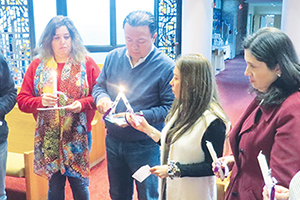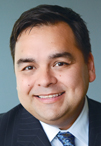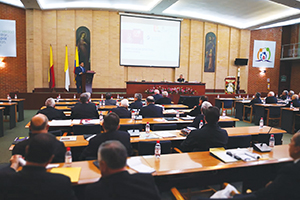By JULIE MINDA
CHRISTUS Health is one of the ministry's most active players internationally, and its international business work is an essential part of its portfolio. To help ensure that work is anchored in CHRISTUS' mission, values and identity, the system makes mission integration a priority in its international partnerships, says George Avila, vice president of mission integration for the international operations of CHRISTUS.

Executives from CHRISTUS Health partners in Latin American participate in the closing ritual for CHRISTUS' Spanish Ministry Leadership Formation Program. The ritual symbolizes how these leaders are the light and spark to extend the healing ministry of Jesus Christ. From left are: Gabriela Novoa, general counsel, Chile's Red de Salud UC CHRISTUS; Carlos Montemayor, chief executive of Saltillo Hospital, part of Mexico's CHRISTUS Muguerza; Hicsa Vivas, general counsel of CHRISTUS Sinergia Salud in Colombia; and Maria Fernanda Gualdron, vice president of the network of care for CHRISTUS Sinergia Salud.
Through a deliberate process of learning, relationship-building and integration of cultures, CHRISTUS set out to bring its partners into its system in a way that preserves the partners' priorities and character while advancing the Catholic mission of its ministry.
"You can't just roll out your plans" in a new country, Avila says. "You need to take time to really get to know the people you're working with and to learn from them. They are the experts."
Expansion through investment
CHRISTUS' international expansion started in 2001, when it entered into a joint venture with the 10-hospital Muguerza company, a private, secular system in Mexico run by the Muguerza family. CHRISTUS is the majority owner in that deal. In 2014, CHRISTUS began a 50-50 partnership with the Catholic university health system called Pontificia Universidad Católica de Chile in Red de Salud UC-CHRISTUS, a Catholic system that includes three hospitals and an outpatient clinic network. And, in 2016, CHRISTUS signed an agreement to share ownership and management of Sinergia Salud, a secular, for-profit cooperative in Colombia with two hospitals and a network of 90 outpatient facilities. All three systems are managed by CHRISTUS and operated as Catholic health care ministries.
Avila says that these international organizations are part of "one CHRISTUS" — a family of facilities that operates with a sense of "systemness" while also creating space for individual facilities to preserve their heritage and local character.

Avila
To help ensure fit in advance, during negotiations in the courting and due diligence stage of the partnerships, CHRISTUS gets to know well the partners' culture, mission, values and expectations — and the system is clear with prospective partners about these aspects of CHRISTUS.
"Language is included in definitive agreements that highlights aspects of our ministry identity that will be followed throughout the partnership," says Avila. This includes in the case of the Latin American partnerships the role of vice president of mission integration. The position is to be on the executive team in the new combined organizations. Avila says this formal role was new to CHRISTUS' Latin American partners.
Establishing structure
The Sisters of Charity of the Incarnate Word of San Antonio and of Houston and the Sisters of the Holy Family of Nazareth, which are the sponsors of CHRISTUS, wanted to ensure a more cohesive and integrated approach within CHRISTUS with respect to mission integration at the Latin American partnerships, and so Avila was hired in 2016 to support this aim, Avila says.
Avila and other CHRISTUS leaders offer guidance to the mission executives and other leaders in each partner organization as they build out mission departments.
Avila says all three of CHRISTUS' Latin American partners have hired vice presidents of mission integration. The Mexican and Chilean partners also have added directors of community benefit, spiritual care and mission and values. Beyond its top mission leader, the newest partner, the Colombian partnership, has hired a coordinator for mission and values as well as chaplains.
Getting to know you
Avila works with the vice presidents of mission integration as they establish their mission departments and build the teams and structures necessary to integrate mission into their organizations.
This requires a formal process for attending to how Catholic identity, theology, spiritual care, ethics, community benefit and leadership formation are addressed — even in the secular organizations.
Every country, every region, every organization and even every facility are different, and so Avila is careful to give the ongoing getting-to-know-you and relationship process ample time and attention. From the outset of the partnerships, CHRISTUS executives have involved the topmost executives in the partnerships to get buy-in and leadership in the work to structure mission processes and goals. It's a collaborative, iterative process.
Avila and a team from CHRISTUS headquarters in Irving, Texas, offer practical support to the fledgling mission departments. Avila solicits input from his Latin American colleagues on how the elements of mission integration might best be implemented at each international site.

George Avila, vice president of mission integration for the international operations of CHRISTUS Health, at the podium, presents to the Episcopal Conference of Bishops in Bogotá, Colombia, where CHRISTUS has a partnership with a secular, for-profit cooperative. Avila explained CHRISTUS' plans for its ministry in Colombia.
Community benefit
Avila says agreements with all partners include that each partner will have a formal community benefit program. CHRISTUS provides the organizations with tools and structure to establish such a program — resources are linguistically and culturally appropriate to each partner, he adds.
Avila says each partner conducts a structured community health needs assessment and community health improvement plan process, as do all of CHRISTUS' U.S. ministries.
Undertaking this community benefit work has been labor-intensive, since the U.S. approach to community benefit is a new concept to CHRISTUS' international partners. It fell to Avila to explain how community benefit programs can advance care of the poor and vulnerable, and he worked hand in hand with the in-country vice presidents of mission integration to engage staff at the Latin American hospitals in prioritizing the work, he says.
Based on the community health needs assessments, CHRISTUS' Mexican operations now focus on adult diabetes as part of their community benefit work and the system's Chilean operations, on adolescent mental health. The Colombian operations are still assessing where to concentrate their community benefit work.
Integration
Avila says several steps have eased the integration process. First, CHRISTUS has been using an executive exchange program with its leaders in the U.S. and Latin America. "We've dipped them in our culture," he says of the executives in the Latin American partnerships, "and then they become catalysts" on CHRISTUS' behalf in their home organizations. He says this approach is attracting brilliant people to the ministry.
He notes that all executives traveling between countries receive extensive preparations in what to expect at their destinations. He notes that "when onboarding those who are traveling, we emphasize that they should be mindful of the partners' perspective and not to impose on them. It's a dialogue."
CHRISTUS offers a Spanish-language ministry leadership formation program for executives of its Latin American partner organizations. The four two-day sessions take place every two months at CHRISTUS' headquarters. The first dozen leaders completed the experience last year, and a new cohort will start next month.
Recently, Avila has been working with mission executives in the three countries to build and strengthen relationships with their respective Catholic bishops' conferences — a first in each of the countries.
Avila says the international work benefits CHRISTUS domestically as well. For instance, CHRISTUS has used pain management learnings from Mexico in its fight against the opioid epidemic. And the system is learning from a successful executive development program for women in Mexico, advancing diversity and inclusion priorities for the entire CHRISTUS system.
The Latin American ministries "will influence us more and more over time," he says.
Ascension elevates cultural competency in its international strategy For nearly three years, St. Louis-based Ascension has been expanding its international business through its Ascension Holdings International subsidiary. That subsidiary markets Ascension's expertise in business services to health care facilities overseas. Central to the success of this work, say Ascension Holdings International executives, is an effort to fully understand the prospective clients' culture, to lay the foundation for trusting relationships and to ensure fit. Like most international companies, Ascension strives to prepare system executives and frontline staff to be culturally competent and effective ambassadors before they travel overseas. Says Jim Beckmann, senior vice president and chief operating officer of Ascension Holdings: "We ensure they understand the purpose of their work and that they understand the country's culture. We brief them to give them an understanding of governmental bodies, the cultural norms and many other aspects of the country destinations." Beckmann says Ascension emphasizes in this training "it is important for us to listen. We're collaborating and creating a dialogue." Slow build
Ascension works internationally in a wide variety of health care operations, including supply chain, food service and facilities management.
The relationship between Ascension Holdings and its international clients usually starts at a slow pace. Ascension Executive Vice President John Doyle begins discussions with clients to determine if there is proper alignment between the organizations. Doyle says it's been instructive for him to accommodate the deliberative approach to partnership, which is common in the countries where Ascension is providing expertise. "In the United States, it's very fast-paced. We go in, we discover the issue, and we agree on the solution. In other countries, it's very relationship-oriented. They want to take time to know you — they want to be sure you'll (deliver on promises). Early in the process, we're building credibility and overcoming concerns." Once Ascension Holdings executives establish a business relationship and sign the contract, associates who have done relevant work at some of Ascension's 151 U.S. hospitals staff the international teams. Ascension Holdings has been working with health care companies in Ireland, England, Germany, Singapore and Australia. Ascension Holdings has a joint venture with Ramsay Health Care, a large Australian hospital system. They've formed a global health care buying group which is based in the U.K.: Ascension Ramsay NuSoarceGlobal. Crash course
Doyle and Beckmann say Ascension Holdings engages with several organizations and individuals with knowledge of the destination countries to support the training of its associates who will be working overseas. They say economic development agencies, embassies and U.S. universities and governmental agencies can provide an extensive amount of information on how to prepare to be a respectful guest in the country.
Mutual benefit
Doyle says the experience overseas broadens the perspectives of Ascension associates, forces them out of their comfort zone in a positive way, and gives them a new level of energy in their day-to-day work at Ascension.
He says Ascension's long history — some of its health care ministries have been operating for more than a century — is reassuring to overseas partners. As is its underlying mission. "Ascension Holdings International was designed to extend our mission and ministry globally and to strengthen Catholic health care," Doyle says. The organization's clients "know that the dollars we bring in, go into our ministry. All of this resonates with them." — JULIE MINDA |